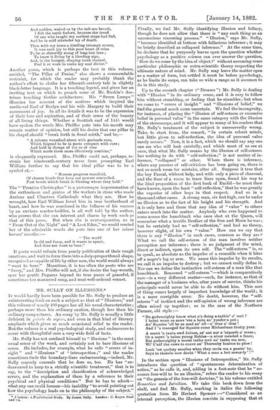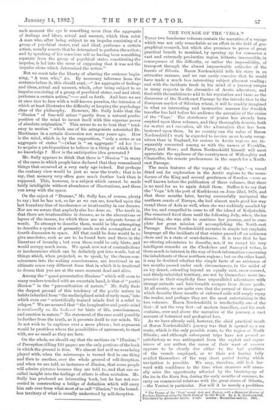MR. SULLY ON ILLUSIONS.*
IT would hardly have been possible for Mr. Sully to produce an uninteresting book on such a subject as that of "Illusions," and this volume of nearly 400 pages has all his usual characteristics ; perhaps more than his ordinary caution, though less than his ordinary compactness. An essay by Mr. Sully is usually a little deficient in .pints de repave, and even in that kind of literary emphasis which gives so much occasional relief to the reader. But the volume is a real psychological study, and endeavours to cover with thoughtful care a very wide field of facts.
Mr. Sully has not confined himself to " illusions " in the most usual sense of the word, and certainly not to bare illusions of sense. He includes, for example, what he calls " errors of in- sight " and " illusions " of " introspection ;" and the reader sometimes finds the boundary-lines embarrassing,—indeed, Mr. Sully scarcely conceals that he does so, too. He has "en- deavoured to keep to a strictly scientific treatment," that is to say, to the "description and classification of acknowledged errors, and the explanation of them by a reference to their psychical and physical conditions." But he has to admit— what any one could foresee—his inability "to avoid pointing out bow the psychology leads on to the philosophy of the subject."
• Liusiona: a Psychological Study. By James Sully. London : C. Kogan rant and Co. Finally, we find Mr. Sally identifying illusion and fallacy, though he does not allow that there is " any such thing as an
unconscious reasoning process." "Illusion," says Mr. Sully, "becomes identified at bottom with fallacious inference ; it may
be briefly described as collapsed inference." At the same time, he declares that he purposely leaves open the question whether psychology as a positive science can ever answer the question, ' How do we come by the idea of object P' without assuming some
particular philosophic or extra-scientific theory respecting the ultimate nature of mind. Mr. Sully may leave the matter open as a matter of form, but settled it must be before pyschology, as he limits its scope, can take so wide a range as it assumes to do in this study.
Up to the seventh chapter (" Dreams ") Mr. Sully is dealing with "Illusion " in its ordinary sense, and it is easy to follow him without stumbling, or feeling that he stumbles; but when we come to " errors of insight " and " illusions of belief," we find the ground much more uncertain. We feel the incongruity, for instance, of placing the "illusion of self-esteem or excessive belief in personal value" in the same category with the illusion of the stereoscope, and it will appear to many of his readers that Mr. Sully's treatment of the subject is unreservedly wrong. Take, to start from, the remark, "In certain robust minds, but little given to self-reflection, the idea of personal value rarely occurs." Now, it is a fact, which we should say any one can see who will look carefully, and which most of us see at once, that what Mr. Sully means by the illusion of self-esteem has nothing to do with " self-reflection ;" is not matter of in- ference, "collapsed" or other. Where there is inference, where any process of self-criticism has been going on, there is not so much room for mistake, after all. Suppose it true that the boy Pascal, without help, and with only a piece of charcoal, and the floor of a room to trace lines upon, found his way to the 32nd proposition of the first book of Euclid—he must then have known, upon the least " self-reflection," that he was greatly the superior of other boys in that respect. And so in a thousand other cases. A strong man, six feet high, can be under no illusion as to the fact of his height and his strength. And it is only here and there that any idea of " value" to others enters much into the matter. Anybody who ever happened to come across the hunchback who once shot at the Queen, will remember what a terrific Brother of the Sun and Moon he was ; but he certainly had no " self-reflection," and had no theory, however slight, of his own " value." How can we say that there is any " illusion " in such cases, common as they are ? What we call the self-esteem of the man involves neither perception nor inference ; there is no judgment of the mind, direct or indirect, upon its own self. The " self-esteem " is, so to speak, as absolute as the impulse of a crocodile when it bites off a negro's leg or arm. We name this impulse by its results, we call it an impulse to destroy ; but we cannot really define it. Nor can we define the instinctive self-esteem of a man like that hunchback. Reasoned " self-esteem "—which is comparatively rare—is a very different matter—such, for instance, as that of the manager of a business who, after years of service, thinks his principals would never be able to do without him. This sort of thing comes largely of imperfect knowledge of the world; it is a mere corrigible error. No doubt, however, the " self- esteem " of instinct and the self-opinion of wrong inference are often mixed up together ; as in the case of the Northern Farmer, old style :—
" Do godamoighty knaw what a's doing a-taakin' o' men P
I betint wonn as saws 'ere a bean an' yonder a pea ; An' Squoire 'ull be sa mad an' all—a' dear a' dear ! And I 'a managed for Squoire come Michaelmas thutty year.
A mowt 'a taacn owd Janes, as' ant nor a 'atiporth o' sense; Or a mowt 'a taiien young Robins—a niver mended a fence, But godamoighty a moost taake men an' taake ma now, Wi' Waal the cows to cane an' Thurnaby hoalms to plow !
Look 'ow quoloty smoiles when they seas ma a passin' by, Says to thessen naw doubt ' What a man a bell sewer-ly ' !"
In the section upon "Illusions of Introspection," Mr. Sully introduces the question of " spontaneous determination of action," as he calls it, and, adding in a foot-note that he " as- sumes free-will to be an illusion," refers the reader to his essay on " the genesis of the free-will doctrine," in his volume entitled Sensation and Intuition. We take this book down from the shelf, and find Mr. Sully, marking in italics the following quotation from Mr Herbert Spencer :—" Considered as an internal perception, the illusion consists in supposing that at
each moment the ego is something more than the aggregate of feelings and ideas, actual and nascent, which then exist- A man who, after being subject to an impulse consisting of a group of psychical states, real and ideal, performs a certain action, usually asserts that he determined to perform the action ; and by speaking of his conscious self as having been something separate from the group of psychical states constituting the impulse, is led into the error of supposing that it was not the impulse alone which determined the action."
But we must take the liberty of altering the sentence begin- ning, " A man who," &e. By necessary inference from the sentence before it, this should read,—" An aggregate of feelings and ideas, actual and nascent, which, after being subject to an impulse consisting of a group of psychical states, real and ideal, performs a certain action,"— and so forth. And here we are at once face to face with a well-known paradox, the intrusion of which at least illustrates the difficulty of keeping the psychology clear of the philosophy. However, Mr. Sally holds that the " illusion " of free-will arises " partly from a natural predis- position of the mind to invest itself with this supreme power of absolute origination?' This seems to us to beat that " tend- ency to motion" which one of his antagonists astonished Dr. Martineau in a certain discussion not many years ago. How is the mind, which is, by the supposition, "only a series or an aggregate of states "—(what is " an aggregate " ad hoc ?)- to acquire a predisposition to believe in a thing of which it has no knowledge ? How is the anticipative idea generated P Mr. Sully appears to think that there is " illusion " in many of the cases in which people have declared that they remembered things that occurred at a very early age indeed. But perhaps the contrary view would be just as near the truth ; that is to say, that memory very often goes much further back than is supposed. This, however, is a subject which cannot be made fairly intelligible without abundance of illustrations, and these run away with the space.
On the suject of "Dreams," Mr. Sully has, of course, plenty to say ; but he has not, so far as we can see, touched upon the last boundary-line of incoherence or irrationality in our dreams. Nor are we aware that anybody else has done so. The truth is, that there are irrationalities in dreams, as in the aberrations or lapses of the insane, for which there are no adequate forms of words. To attempt to describe them, would be like attempting to describe a system of geometry made on the assumption of a fourth dimension to space. All that could be done would be to give anecdotes, such as are to be found here and there in the literature of insanity ; but even these could be only hints, and would occupy much room. We speak now not of contradictions or incoherencies which can be definitely put into words, but of things which, when projected, so to speak, by the dream-con- sciousness into the waking consciousness, are irrational in an ultimate sense very different from that in which it is irrational to dream that you are at the same moment dead and alive.
Among the "quasi-presentative illusions" which will seem to many readers touched with an uncertain hand, is that of " poetic illusion " in the " personification of nature." Mr. Sully finds the deepest .ground of this tendency of the poetic nature in habits inherited from "the undisciplined mind of early man," into which even our " scientifically trained minds find it a relief to relapse." We are assured that " the imaginative and poetic mind is continually on the look-out for hints of life, consciousness, and emotion in nature." No statement of the case could possibly be further from the truth, as it presents itself to our minds. We do not wish to be captious over a mere phrase; but argument would be profitless where the possibilities of agreement, to start with, are as small as they are here.
On the whole, we should say that the sections on " Illusions " of Perception (filling 126 pages) are the only portions of the book in which the ground is firm. We almost feel as if we were being played with, when the microscope is turned first to one thing and then to another, over the whole ground of self-deception, and when we are told, as instances of illusion, that some people will admire pictures because they are told to, and that our so- called insight into the feelings of others is often mistaken. Mr. Sully has produced an interesting book, but he has not suc- ceeded in constructing a bridge of definition .which will carry him safe over from what most of us call "illusion," to the bound- less territory of what is usually understood by self-deception.







































 Previous page
Previous page